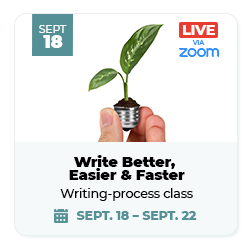Develop more creative ideas with this system
Have you ever come up with a brilliant idea — on the way home from the brainstorming meeting? Developed a creative theme for the annual report while pulling weeds? Written the perfect headline in the shower?

Welcome to the wonderful world of the creative process, where working sometimes doesn’t look like working, and where sticking with it is often the worst thing you can do to move ahead.
I’ve used the five-step creative process every day since I learned it at Hallmark Cards a million years ago. But I’ve recently learned that it was the creation of a pre-Mad Men-era ad executive named James Webb Young, who put it down in a book called A Technique for Producing Ideas.
Master these five stages of the creative process:
- Forage, or gather information. This is the “feed your brain,” or preparation stage, of the process. Here’s where you conduct market research and interview sources — or hit the mall, museum and movies — for the raw material that will become your idea or story.
- Analyze that information. Now that you have your raw materials, focus, sift through and organize them to see how the pieces fit together. Look for themes, holes, relationships and structure.
- Incubate. Let the information simmer. This is where you take your eye off the ball and let the back of your mind work on your project for a while. As Agatha Christie used to say, “The best time to write is when you’re doing the dishes.”
- Break through. This is the aha! moment — the magical step where your brain presents a brilliant idea fully formed. This is where you come up with answers to questions like “What should I use for my lead?” and “How am I going to organize this thing?”
- Knuckle down. Take Ernest Hemingway’s advice and “apply the seat of your pants to the seat of the chair.” In other words, turn your great idea into a great story.
Follow these steps in this order, and you’ll soon find that you’re coming up with more — and better — ideas.
Work with — not against — your brain
While we talk a lot about what to write — More stories! Fewer words! Shorter sentences! — we don’t focus so much on how.

Writing is hard because we weren’t taught how to write. Instead, we were taught how to edit: how to spell, punctuate and use the right grammar.
But there is a how to writing. Learn a few simple steps that will make your writing time more effective and efficient at How to write Better, Easier & Faster — our writing-process workshop starting Sept. 18.
You’ll learn to invest your time where it’ll do you the most good … stop committing creative incest … even save time by editing before writing.
Save up to $100 with our group discounts.
